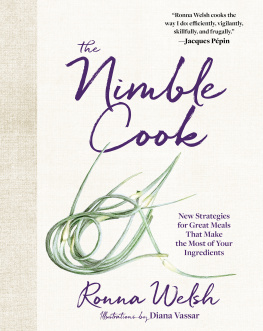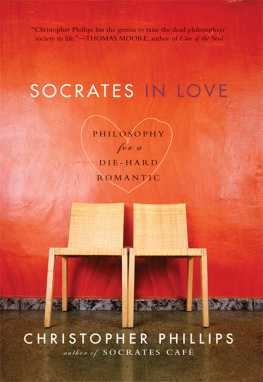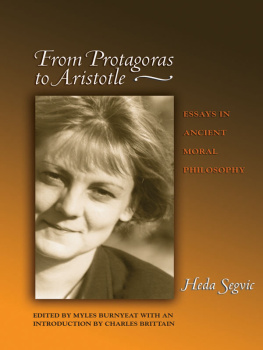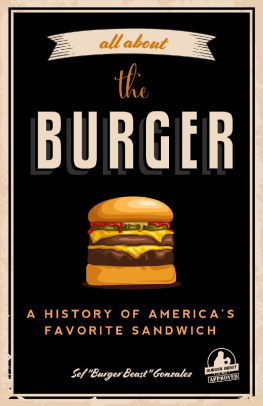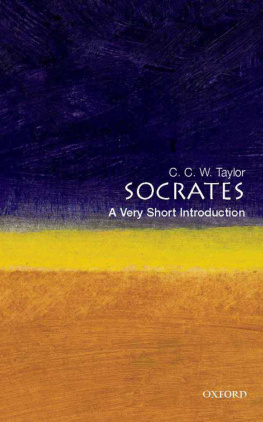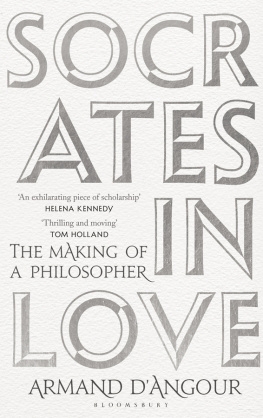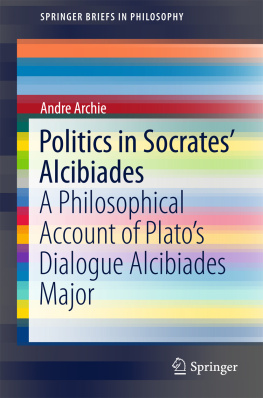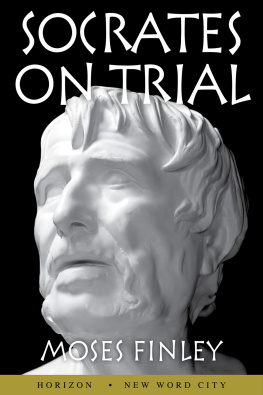Ronna Burger - Aristotles Dialogue with Socrates
Here you can read online Ronna Burger - Aristotles Dialogue with Socrates full text of the book (entire story) in english for free. Download pdf and epub, get meaning, cover and reviews about this ebook. publisher: University of Chicago Press, genre: Romance novel. Description of the work, (preface) as well as reviews are available. Best literature library LitArk.com created for fans of good reading and offers a wide selection of genres:
Romance novel
Science fiction
Adventure
Detective
Science
History
Home and family
Prose
Art
Politics
Computer
Non-fiction
Religion
Business
Children
Humor
Choose a favorite category and find really read worthwhile books. Enjoy immersion in the world of imagination, feel the emotions of the characters or learn something new for yourself, make an fascinating discovery.

- Book:Aristotles Dialogue with Socrates
- Author:
- Publisher:University of Chicago Press
- Genre:
- Rating:4 / 5
- Favourites:Add to favourites
- Your mark:
- 80
- 1
- 2
- 3
- 4
- 5
Aristotles Dialogue with Socrates: summary, description and annotation
We offer to read an annotation, description, summary or preface (depends on what the author of the book "Aristotles Dialogue with Socrates" wrote himself). If you haven't found the necessary information about the book — write in the comments, we will try to find it.
Aristotles Dialogue with Socrates — read online for free the complete book (whole text) full work
Below is the text of the book, divided by pages. System saving the place of the last page read, allows you to conveniently read the book "Aristotles Dialogue with Socrates" online for free, without having to search again every time where you left off. Put a bookmark, and you can go to the page where you finished reading at any time.
Font size:
Interval:
Bookmark:



ACKNOWLEDGMENTS
A book is produced by art; it does not grow by nature. Yet if ones work goes on for long enoughas in the present instancethat clear-cut boundary begins to be blurred. Under those circumstances, too many debts are accumulated to acknowledge individually and some too great to acknowledge in the way they deserve. In such cases, thoughAristotle speaks of gods, parents, and fellow participants in philosophyone must pay back what one can, no matter how far it falls short of what one owes.
Writing, like thinking, is a solitary activity; but my own internal dialogue has been enriched and enlivened by discussion with friends and my expression of it enhanced by their responses, for which I owe special thanks to Michael Davis, Mary Nichols, and Stuart Warner. As my work on Aristotle developed I learned much from presenting it to receptive but challenging audiences at conferences and college campuses, including St. Johns in Annapolis and Santa Fe, the University of Chicago, Boston College, the Catholic University of America, Assumption College, Roosevelt University, Howard University, the University of Dallas, Villanova University, Middlebury College, Boston University, and Fordham University. I am particularly grateful to my graduate students at Tulane, past and present, with whom I have worked out my understanding of Plato and Aristotle in ways that continue to feel like an adventure. In bringing this study to its present public form, it is my good fortune to have had the initial encouragement and ongoing support of my editor, John Tryneski, at the University of Chicago Press. The manuscript in its final stages benefited from comments and questions raised by readers for the Press and from the careful work of my copy editor, Mary Caraway.
The plan for this project began to emerge in the course of several summers of concentrated research and writing, supported by fellowships from Tulane University, the Earhart Foundation, and the National Endowment for the Humanities. It was a distinctive privilege to have a research fellowship at the Carl Friedrich von Siemens Foundation in Munich in 19992000 and, in particular, to share ideas with Heinrich Meier, director of the Foundation, whose interest in this project has helped sustain it over time. The prelude to that year in Munich was a public talk I presented at the Siemens Foundation in 1994. On that occasion, I had the honor of being introduced by my mentor, Seth Benardete, who made this remark: Heidegger found Sophocles tragedies to be a philosophic reflection on ethics superior to Aristotles, but Burger promises to bring Aristotles Ethics back into the fold of philosophy. If I have been able to pursue that promise, it is on the basis of an understanding of philosophy and the experience of its distinctive pleasures that I came to know over my years of study and conversation with Benardete. He is not here to see this project come to fruition, but his influence will be evident throughout.
My first discoveries of the treasures of Aristotles Ethics occurred almost as long ago as the birth of my son, now a college student; watching his life take shape, while reflecting, in memory, on the place of my parents in my own, has kept me in touch with the reality of the questions this book addresses. My exploration of Aristotles thought, and through it our own fundamental concerns, is something I have shared from the start with my husband, Robert Berman. We lived together with this study all along, and there are few ideas or arguments in it that were not clarified, deepened, and extended by his questioning and analysis.
I should acknowledge, finally, my appreciation of the unintended consequences of unwished-for circumstances. Forced by the aftermath of Hurricane Katrina to evacuate New Orleans during the fall semester of 2005, a generous family in Houston provided us a home away from home. Lucky to have my laptop computer stored with all my previous work and finding myself abruptly freed for a time from my usual academic responsibilities, I was able to complete a draft of the book that I now hand over to an unknown audience.
INTRODUCTION
The Socratic Question of the Ethics
Aristotle sees the perfection of man as Plato sees it and more. However, because mans perfection is not self-evident or easy to explain by a demonstration leading to certainty, he saw fit to start from a position anterior to that from which Plato had started.
And it has become evident that the knowledge that he [Aristotle] investigated at the outset just because he loved to do so... has turned out to be necessary for acquiring the intellect for the sake of which man is made.
Alfarabi, The Philosophy of Aristotle, i and xix1
Aristotles Nicomachean Ethics addresses a question of the utmost importance to us: What is the human good? Or, as the question comes to be elaborated, What is happiness? What is the good life for a human being? Its exploration of this question has made the Ethics one of the most influential works in the philosophical tradition, yet what exactly its teaching is has long puzzled readers and provoked much debate. The very arrangement of the text and the problems posed by it might lead one to wonder whether there is any underlying argument that makes the work a coherent whole. After grappling with its fundamental question about the human good in Book I, the inquiry enters upon what looks like a long, indirect path to its goal, beginning with an investigation of virtue; when, at the end of the tenth and last book, it finally returns to its original question, or something close to it, the answer proposed appears to leave behind much of the rich understanding of human life developed along the way.
Wherever the path of the Ethics finally leads, the question to which it responds sets Aristotle on a course following in the footsteps of Socrates. According to the history of philosophy that Aristotle constructs in Metaphysics A, Socrates took a decisive step when he abandoned the cosmological speculation of his predecessors and turned his attention to the human things.2 Socratic inquiry, whatever its specific starting point on any occasion, is directed ultimately to the question, What is the good life for a human being? In devoting itself to this fundamental question, the Ethics looks like the Socratic work in the Aristotelian corpus; whether it is a Socratic manner in which the Ethics proceeds, or a Socratic conclusion at which it arrives, is far less obvious.
Doubts might be raised, in the first place, by the manifest difference in form between the Aristotelian treatise and the Platonic dialogue as the exemplary representation of the Socratic practice of philosophy. The speeches of the dialogue belong to the characters who utter them; Plato remains hidden behind this representation and utters no view of his own within it. In the treatise, presumably, Aristotle speaks entirely in his own name; there should be no occasion and no need to interpret arguments or opinions as those of a character other than the author. In almost all the Platonic dialogues, the leading figure is the Socrates renowned for his practice of ironyin particular, the irony of a disclaimer to knowledge that, in the eyes of his interlocutors, is undercut by his conduct of the conversation.3 The Platonic dialogue imitates the Socratic practice of irony in its own art of writing, using as its primary tool a contradiction or discrepancy between speeches and action.4 The treatise, one would assume, has neither the need nor the means for such a practice.
Font size:
Interval:
Bookmark:
Similar books «Aristotles Dialogue with Socrates»
Look at similar books to Aristotles Dialogue with Socrates. We have selected literature similar in name and meaning in the hope of providing readers with more options to find new, interesting, not yet read works.
Discussion, reviews of the book Aristotles Dialogue with Socrates and just readers' own opinions. Leave your comments, write what you think about the work, its meaning or the main characters. Specify what exactly you liked and what you didn't like, and why you think so.


